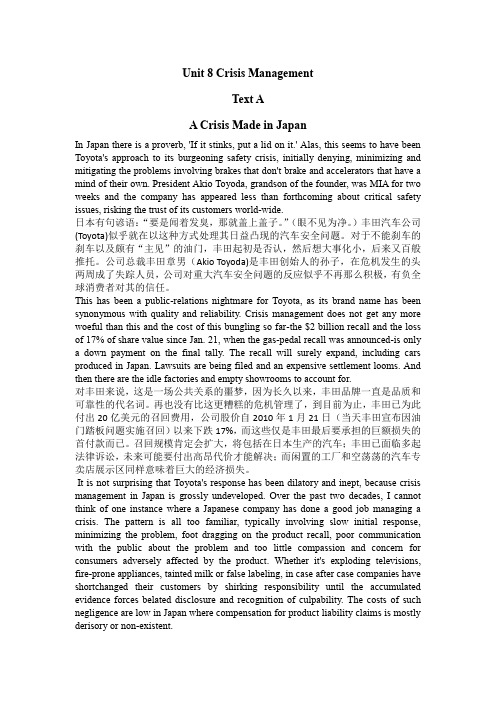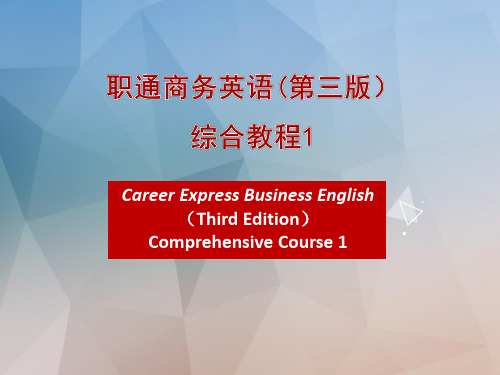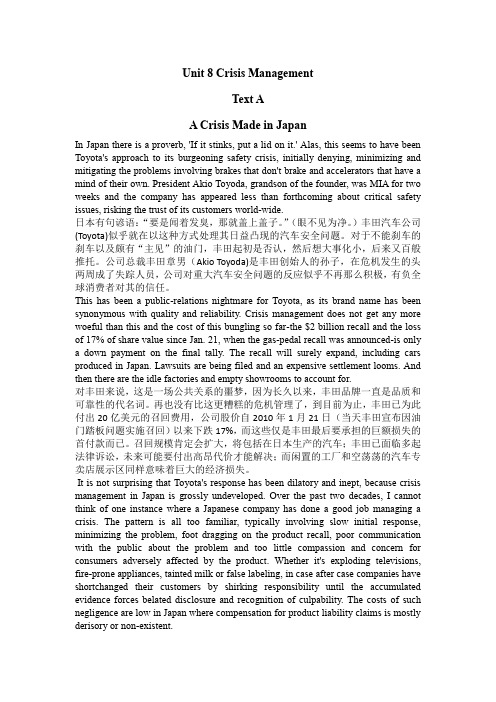高级商务英语1 unit8Crisis Management
商务英语综合教程第一册Unit 8 Job And Health

Background Information
• An occupational disease is any chronic ailment that occurs as a result of work or occupational activity. It is an aspect of occupational safety and health. An occupational disease is typically identified when it is shown that it is more prevalent in a given body of workers than in the general population, or in other worker populations. The first such disease to be recognised, squamous-cell carcinoma of the scrotum was identified in chimney sweepboys by Sir Percival Pott in 1775. Occupational hazards that are of a traumatic nature (such as falls by roofers) are not considered to be occupational diseases.
Text Analysis
• envelope
• 1. N-COUNT An envelope is the rectangular paper cover in which you send a letter to someone through the mail. 信封
专业英语八级核心词汇

专业英语八级核心词汇Professional English Level 8 Core Vocabulary。
Introduction:In this document, we will explore the core vocabulary required for the Professional English Level 8 examination. This comprehensive list of words will help candidates improve their language skills and enhance their proficiency in the professional context. The following sections will cover various domains, including business, finance, marketing, technology, and more.Business Vocabulary:1. Entrepreneurship: The process of starting and managing a business venture.2. Strategic planning: The process of defining an organization's objectives and determining the best way to achieve them.3. Leadership: The ability to guide and inspire others towards a common goal.4. Innovation: The introduction of new ideas, products, or processes.5. Collaboration: Working together with others to achieve a common objective.6. Negotiation: The process of reaching an agreement through discussion and compromise.7. Stakeholder: An individual or group with an interest or concern in a business or project.8. Sustainability: The practice of using resources in a way that meets present needs without compromising future generations' ability to meet their own needs.Finance Vocabulary:1. Asset: Something of value owned or controlled by a person, organization, or country.2. Liability: A financial obligation or debt.3. Revenue: Income generated from business activities.4. Profitability: The ability of a business to generate profit.5. Cash flow: The movement of money in and out of a business.6. Investment: The act of putting money into something with the expectation of gaining a return or profit.7. Risk management: The process of identifying, assessing, and prioritizing risks to minimize their impact on business operations.8. Capital: Financial resources available for investment.Marketing Vocabulary:1. Market segmentation: Dividing a market into distinct groups based on characteristics, needs, or behaviors.2. Branding: The process of creating a unique name, design, or symbol that identifies and differentiates a product or company.3. Advertising: The promotion of products or services through various media channels.4. Consumer behavior: The study of individuals, groups, or organizations and the processes they use to select, secure, use, and dispose of products, services, experiences, or ideas.5. Market research: The collection and analysis of data to understand and interpret market trends, customer preferences, and competitor strategies.6. Product placement: The inclusion of branded products or references in entertainment media.7. Public relations: The management of communication between an organization and its publics.8. Sales promotion: Short-term incentives to encourage the purchase or sale of a product or service.Technology Vocabulary:1. Artificial intelligence: The simulation of human intelligence in machines that are programmed to think and learn.2. Big data: Large and complex data sets that require advanced techniques to analyze and interpret.3. Cloud computing: The practice of using a network of remote servers hosted on the internet to store, manage, and process data.4. Cybersecurity: Measures taken to protect computer systems and networks from unauthorized access or attacks.5. Internet of Things (IoT): The network of physical devices, vehicles, appliances, and other objects embedded with sensors, software, and connectivity to exchange data.6. Virtual reality: A computer-generated simulation of a three-dimensional environment that can be interacted with in a seemingly real or physical way.7. Blockchain: A digital ledger in which transactions made in cryptocurrencies are recorded chronologically and publicly.8. Data mining: The process of discovering patterns in large data sets using techniques at the intersection of statistics and computer science.Conclusion:Mastering the core vocabulary for Professional English Level 8 is essential for individuals seeking to excel in the professional world. This document has provided an extensive list of words in various domains, including business, finance, marketing, and technology. By incorporating these words into their everyday language, candidates can enhance their communication skills and increase their chances of success in the professional arena.。
《高级综合商务英语1》参考答案

高级商务英语系列教材总主编:叶兴国王光林高级综合商务英语1主编:彭青龙(习题答案)外语教学与研究出版社Unit 1 GlobalizationLead-in1. Quiz1) B 2) C 3) D 4) A 5) A2. A Mini CaseSuggested answers:●As Zara continues to expand, it might have to open other distribution centers onother continents. Language, culture, and work relations may vary significantly from the closely-managed operation currently in place in Spain. The company may run into more specific challenges in accommodating customers‘requirements due to a lack of cultural sensitivity. Zara‘s expansion globally may pose the challenge of moving from a more centralized management style to a more global style.●Lorena needs to ensure that she has a truly international team in place withmembers from both multilingual and multicultural background; draw up a plan on how global logistics will support global expansion; start a succession plan and train new logistics managers who could be ready to take on overseas responsibilities; and encourage store managers to include suggestions on cultural specifics which may help in making the final product and brand expansion successful.Text AI.Reading Comprehension1.Determine whether the following statements are true or false. Write a T fortrue, an F for false, and an NG for not given.1) T 2) F 3) T 4) F 5) F 6) T 7) T 8) F 9) T 10) NG2.Essay Questions1)The modern multinational companies have had passed through three phases. Firstcame the 19th-century ―international model‖, with firms based in their home country and selling goods through overseas sales offices. This was followed by the classic multinational firm in which the parent company created smaller versions of itself in countries around the world. And now it has been replaced by a single integrated global entity in which the firm will move people and jobs anywhere in the world, based on the right cost, the right skills and the right business environment.2)The big attractions from emerging markets are low-cost labor, highly skilledpersonnel, and a chance to cooperate with the government as a potential customer.3)They are lacking the management talents who can practice and support businessoperating models that will allow them to generate profitable growth in more mature markets over the long term.4)The single biggest challenge facing Western multinationals is the lack ofemerging-market experience in their senior ranks. Moreover, multinationals have great trouble retaining the managers they do have in emerging markets.―Well-trained, good, honest people are scarce in emerging markets. Multinationals are better at training these people than emerging-market companies, which prefer to poach them once they are trained.‖II.Blank-filling: Complete the following sentences with the words given in the box. Change the form when necessary.1) cutting-edge 2) commoditized 3) aggressive 4) forge 5) benchmark 6) blueprint 7) expatriates 8) deploy 9) ferocious 10) substantial III.Paraphrasing1.Rewriting: Rewrite the underlined part of each sentence in your own words.1) ―In the 97 years of the company‘s history, never had a particular kind of product or merchandise been managed outside the U.S.,‖he says excitedly, noting that ―Latin America now reports to Shanghai.‖2) But the assault on its services business led by a trio of Indian outsourcing upstarts, Tata Consulting Services, Infosys and Wipro, posed a big threat to the field that might be the main sources of growth for the company as expected by Mr. Palmisano.3) In many emerging markets the most attractive potential customer is the government, because of the government‘s urgent needs to improve the infrastructure facilities in a wide range, from the mobile telephone networks to roads, airports and ports, energy and water supply.4) A 2007 study of China‘s top 200 publicly traded companies found that it is still difficult even for the leading companies in China to compete with those global giants.5) American multinationals now have a ―ferocious interest in attracting non-Americans to the board‖, but they can find only a few qualified executives from the European countries, not to mention those from emerging markets.2. Sentence Transformation: Complete the following sentences based on the structures given.1) Because of the fact that hot labor markets in emerging markets are causing extremely high turnover rates, every big multinational is aiming to win the ―war for talent‖ and taking it as one of the most urgent issues.2) It is believed that as a big multinational company it enjoys advantages in recruiting and retaining talented managers than the local competitors.3) Despite the growth of their revenue which increased on the back of China‘s continued economic growth, they could only create half of the value of their global competitors.4) No longer the ―young bucks or retirement-posing types‖as they used to be,nowadays the expatriate managers appointed by multinationals to work in emerging markets are generally of a much higher quality.5) Compared with those old multinationals, the firms in emerging markets are typically lacking the depth of management talent, though the founders are often impressive.IV.Translation1.Sentence Translation1) 这一雄心勃勃的策略是对来自新兴市场的激烈竞争做出的回应。
(完整word版)高级综合商务英语IUnit8TextAACrisisMadeinJapan

Unit 8 Crisis ManagementText AA Crisis Made in JapanIn Japan there is a proverb, 'If it stinks, put a lid on it.' Alas, this seems to have been Toyota's approach to its burgeoning safety crisis, initially denying, minimizing and mitigating the problems involving brakes that don't brake and accelerators that have a mind of their own. President Akio Toyoda, grandson of the founder, was MIA for two weeks and the company has appeared less than forthcoming about critical safety issues, risking the trust of its customers world-wide.日本有句谚语:“要是闻着发臭,那就盖上盖子。
”(眼不见为净。
)丰田汽车公司(Toyota)似乎就在以这种方式处理其日益凸现的汽车安全问题。
对于不能刹车的刹车以及颇有“主见”的油门,丰田起初是否认,然后想大事化小,后来又百般推托。
公司总裁丰田章男(Akio Toyoda)是丰田创始人的孙子,在危机发生的头两周成了失踪人员,公司对重大汽车安全问题的反应似乎不再那么积极,有负全球消费者对其的信任。
This has been a public-relations nightmare for Toyota, as its brand name has been synonymous with quality and reliability. Crisis management does not get any more woeful than this and the cost of this bungling so far-the $2 billion recall and the loss of 17% of share value since Jan. 21, when the gas-pedal recall was announced-is only a down payment on the final tally. The recall will surely expand, including cars produced in Japan. Lawsuits are being filed and an expensive settlement looms. And then there are the idle factories and empty showrooms to account for.对丰田来说,这是一场公共关系的噩梦,因为长久以来,丰田品牌一直是品质和可靠性的代名词。
职通商务英语(第三版)综合教程1 Unit 8-1

◎ Comprehensive Tasks
Intensive Reading
Read the text opposite and finish the following comprehensive tasks. (1) What is the customer service? (2) How do we define excellent customer services? (3) What is the relationship between the service representatives and the company? (4) Explain how to perform excellent customer services according to the text. (5) In what sense are customer services regarded as crucial to the businesses?
Lead-in Task 1: Talk about customer services.
3 (3) Complaint handling: Customer complaints provide an opportunity to identify and rectify specific problems in your business. They can also help you to develop your relationship with your customer by allowing you to demonstrate that you value their trade by taking their concerns seriously.
高职高专英语I Unit 8教案

课程名称:新世纪高职高专英语Period 1Unit 8 This generation means business授课内容:1. Understand the Text:This generation means business2. Explain the key words and structures in the text.目的要求:1. Learn something about this generation start their businesses and becomesuccessful in life.2. Master the key words and structures in the text有关记录:板书设计:Unit 8 This generation means businessbank⏹development bank⏹Commercial bank⏹Investment bank⏹Construction bankbank card⏹credit card⏹Check card⏹Gift cardbank account⏹checking account⏹Savings account⏹Certificates deposits⏹Individual retirement accountsUnit 8 This generation means businessI.Lead in( 15 minutes)Ask the students to discuss in pairs something about how to start their own businesses and become successful in life, and then ask some pairs to tell their opinions to the whole class.Q1: What did Joe Lampson announce when he was 21 years old?Q2:What kind of software did Lampson try to develop to solve the problem?Q3: Why couldn’t venture capitalists finance Lampson’s new company?II. Read in ( 65 minutes)1. Background Information ( 5 minutes)1) CEOs (chief executive officers)CEOs are among the highest paid workers; however, long hours, considerable travel, and intense pressure to succeed are common. The formal education and experience of CEOs vary as widely as the nature of their responsibilities. Keen competition is expected because theprestige and high pay attract a large number of qualified applicants.2) Credit CardA credit card gives you the power to buy goods or services now and pay for them later. It represents an approval by a bank or company to use their money. Credit card issuers are usually banks, even though the card may bear another company name or logo. The name of the issuer appears somewhere on the card. Trade names such as VISA and MasterCard are not actually card issuers. They are termed “membership associations.” Banks use them for their payment processing services, policy setting and marketing assistance.2. Developing vocabulary (30 minutes)1)dream of: imagine sth. 梦见,梦想e.g. Some people dream of success while others wake up and work hard at it.2) start up: begin a career, working life, etc. 开始从事事业、工作等e.g. start up a new bus company 建立新的公共汽车公司e.g. start up in business 在事业上起步3) achieve: v. perform or carry out with success; accomplish 胜利完成;实现e.g.The university has achieved all its goals this year.e.g.Charles A. Lindbergh achieved a great success by flying the first nonstop solo flight acrossthe Atlantic.4) announce:v. make known publicly 宣布e.g.The government announced that they would build a new highway to the mountain.drop out: leave school, university, etc. without finishing it 中途退学e.g.She got a scholarship to Cambridge but dropped out a year later.Extended words: dropper, droppingsCollocations: drop behind 落伍, 落后drop back 退后, 后撤drop by顺便访问一下5) launch: v.1) set or thrust a self-propelled craft or projectile in motion 发射e.g. launch a rocket2) set going; initiate 发动;开始e.g. launch a careere.g. launch a business ventureExtended words: launchable6) streamline: v. improve efficiency of; modernize 改善效率;使现代化e.g. We must streamline our production procedures.Extended words: streamlined, streamliner7) instinct: n. a natural ability to know what you should do without having to learn or thinkabout it 本能, 直觉e.g.Trust your instincts and do what you think is right.e.g.Birds learn to fly by instinct.Extended words: instinctive, instinctively8) average: a. usual or ordinary in kind or character 普通的,寻常的e.g. He is about average height.e.g. a poll of average people; average eyesightExtended words: averagely, averagenessRelated words: medium, middle, ordinary, usual9) finance: v. supply funds to 给……提供资金e.g. The government will finance the building of the new crossroads with the taxes it collects.10) enterprise: n. a business organization 企业,公司e.g. He successfully managed a state-owned enterprise.Extended words: enterprise less, enterpriser11) turn t o: go to sb./sth. for help, advice, etc.向某人/某事物寻求帮助或指教e.g. The child turned to his mother for comfortCollocations: turn over翻转turn on打开turn away解雇turn off关掉turn in上交turn down拒绝3.Detail study of the text (30 minutes)Paragraph One- Two1) Comprehension QuestionsQ:What did Joe Lampson announce when he was 21 years old?A: He announced that he was leaving Stanford to launch his own software company.2) Main ideaJoe Lampson’s decision surprised his father.Joe Lampson’s program improved the trading situation in business.3)Difficult sentenceNo,” Joe said…being first is everything.”Turning down his father’s request, Joe insisted that a leading position in the software business is a key factor in his career journey.Paragraph Three1) Comprehension QuestionsQ: What kind of software did Lampson try to develop to solve the problem?A: He wanted to develop a computer program that could help companies to calculate which supplier offered the best price while meeting all the customer’s needs.2) Main ideaNo investment in Lampson’s company at first.3)Difficult sentenceYet buying and selling ― the lifeblood of business ― was still being done by instinct.Companies do business with most customers instinctively-the lifeblood of business-was still being done by instinct.Paragraph Four1) Comprehension QuestionsQ: Why couldn’t venture capitalists finance Lampson’s new company?A: Because Lampson had neither experienced managers nor experienced technicians.2) Main ideaJoe Lampson was once heavily in debt.3)Difficult sentenceBanks told him to get lost.Banks told him to go away.Paragraph Five1) Comprehension QuestionsQ:what happened since then ?A :Since his program worked well,other fortune 500 companies wanted to buy the right to use the program.2) Main ideaJoe Lampson became very successful.3)Difficult sentenceSo he turned to…of his generation: plastics.Finally Joe had to overdraw his credit cards, which is known among people of his age as a big investment bankParagraph Six1) Comprehension QuestionsQ: Why did Lampson persuade engineers at Hewlett-Packard to test the Trilogy software?A: Because the company had tried to develop a similar program.2) Main ideaThe situation of today’s Trilogy Development Group.3)Difficult sentenceSince then, orders from other Fortune 500 companies have flooded in.After that, other companies among the Fortune 500 companies sent a large number of orders to Trilogy.Paragraph Seven1) Comprehension QuestionsQ:What do you know about the Trilogy Development Group?A :It is located in Austin, Texas. It has about 400 employees and more than $120 million income in 1996.2) Main ideaThe contemporary trend in the American youth.4)Difficult sentenceParagraph Eight-Ten1) Comprehension QuestionsQ:What is your answer to this question?A :Perhaps it is the pioneering spirit of some successful young entrepreneurs that has inspired more and more young people in America.Q: Why do today’s young people have to grow up fast?A :Because they have to be well prepared to handle anything in the future.2) Main ideaThe young Americans dream about owning their own businesses.3) Difficult sentenceSince then, orders…have flooded in.After that, the other companies among the fortune 500 companies have flooded in.They were like explorers…to handle anything.On their way to success, they had to overcome all the difficulties, just like explorers in a jungle who had to cut their way through.III. Exercise ( 10 minutes)Practice Ex. IIV. Assignments1.Review the text and the key words/phrases2.Finish off Ex. II – Ex. VI3.Preview Grammar; Reading skills; Practical reading and writingV. ExpandOnline learningPeriod 2Unit 8 This generation means business 授课内容:1. Grammar: The Disjunctive Question2. Reading skills: Prereading3. Practical Reading: Reading Indexes and Contents4. Practical Writing: Cover Letter目的要求:1. Master the use of The Disjunctive Question2. Master the reading skill:Prereading3. Learn how to read indexes and contents4. Learn how to Cover Letter有关记录:板书设计:Grammar: The Disjunctive Question反意疑问句◆陈述部分谓语含有need或dare时,疑问部分就要根据这两个词的功能来决定。
高级综合商务英语I Unit8 Text A A Crisis Made in Japan

Unit 8 Crisis ManagementText AA Crisis Made in JapanIn Japan there is a proverb, 'If it stinks, put a lid on it.' Alas, this seems to have been Toyota's approach to its burgeoning safety crisis, initially denying, minimizing and mitigating the problems involving brakes that don't brake and accelerators that have a mind of their own. President Akio Toyoda, grandson of the founder, was MIA for two weeks and the company has appeared less than forthcoming about critical safety issues, risking the trust of its customers world-wide.日本有句谚语:“要是闻着发臭,那就盖上盖子。
”(眼不见为净。
)丰田汽车公司(Toyota)似乎就在以这种方式处理其日益凸现的汽车安全问题。
对于不能刹车的刹车以及颇有“主见”的油门,丰田起初是否认,然后想大事化小,后来又百般推托。
公司总裁丰田章男(Akio Toyoda)是丰田创始人的孙子,在危机发生的头两周成了失踪人员,公司对重大汽车安全问题的反应似乎不再那么积极,有负全球消费者对其的信任。
This has been a public-relations nightmare for Toyota, as its brand name has been synonymous with quality and reliability. Crisis management does not get any more woeful than this and the cost of this bungling so far-the $2 billion recall and the loss of 17% of share value since Jan. 21, when the gas-pedal recall was announced-is only a down payment on the final tally. The recall will surely expand, including cars produced in Japan. Lawsuits are being filed and an expensive settlement looms. And then there are the idle factories and empty showrooms to account for.对丰田来说,这是一场公共关系的噩梦,因为长久以来,丰田品牌一直是品质和可靠性的代名词。
高级商务英语1unit8CrisisManagement

Unit eight
• …shedding the constraints of a fusty corporate culture and wowing customers with a recall and above and beyond after sales service and care (Para. 8)
• In most cases of quality crises, Japanese companies habitually think lightly of their customers by shirking their responsibilities and the costs of such belittlement and negligence are low. But drug company executives paid dearly for selling tainted blood: a rather generous settlement of compensation and an abject apology.
Unit eight
• companies have shortchanged their
customers by shirking responsibility until the accumulated evidence forces belated disclosure and recognition of culpability.
Unit eight
• above-and-beyond (Para.8) • adj. exceeding what is required or expected • example:
- 1、下载文档前请自行甄别文档内容的完整性,平台不提供额外的编辑、内容补充、找答案等附加服务。
- 2、"仅部分预览"的文档,不可在线预览部分如存在完整性等问题,可反馈申请退款(可完整预览的文档不适用该条件!)。
- 3、如文档侵犯您的权益,请联系客服反馈,我们会尽快为您处理(人工客服工作时间:9:00-18:30)。
Unit eight
• …shedding the constraints of a fusty corporate culture and wowing customers with a recall and above and beyond after sales service and care (Para. 8)
• Secondly, due to a corporate culture that values team-work, employees‘ loyalty for firms and concern for corporate image override their compassion for consumer interest.
Unit Eight
Crisis Management
What is crisis management?
What are the keys to effective quality crisis management?
Case study: Tylenol
Unit eight
Para. Main Topics Para. 1-7
Unit eight
• And a high-status company like Toyota has
much to lose since its corporate face is at stake. (Line 4, Para. 6)
• Its corporate prestige is at risk for Toyota enjoying a good market standing.
• 在日本,产品责任的赔偿数额低的可怜或 根本没有赔偿,因此,为这种疏忽付出的 代价是很低的。
Unit eight
• Why is the case of blood contamination of
pharmaceutical companies said to be “one glowing exception to this parsimonious record”?
Unit eight
• What cultural inclinations can Japan’s negligence
of crisis management be ascribed to? (para.6-7)
• First, owning up to product defects poses threats to corporate face, especially for such a highstatus company as Toyota in a nation obsessed with craftsmanship and quality.
Unit ht
• …raise the bar on disclosure and assuming
responsibility.( Para. 6) • Paraphrase • raises people‘s standards for under what
circumstances the truth must be revealed and responsibility must be claimed.
• Paraphrase
• companies have treated their customers unfairly by avoiding responsibility until an increasing amount of evidence obliges them to make a delayed move of revealing the truth and confessing their fault.
Unit eight
1. In Japan, there is a proverb, “If it stinks, put a lid on it.” (Line 1, Para. 1)
• If a situation or a problem arises, seek to cover up or fudge the facts.
• Thirdly, the hierarchical corporate structure and a corporate culture of deference prevent the two-way communication between superiors and subordinates.
Unit eight
• deference (Para. 7)
• He is deferential to his superiors. 他对他的 长官、上司毕恭毕敬
Unit eight
• the focus on consensus and group is an asset
in building teamwork, but also can make it hard to challenge what has been decided or designed. (Para. 7)
Unit eight
• the costs of such negligence are low in
Japan where compensation for product liability claims is mostly derisory or nonexistent.
• Translation
Unit eight
loom (Para. 2) • v. hang over, as of something threatening, dark,
or menacing • synonyms: emerge, appear • example:
National self-confidence has been flagging under the threat of looming recession.
• Translation
• 对一致意见和团队的重视是团队合作的优 势,但这也会使公司难以质疑和挑战已经 做出的决定和设计。
Unit eight
• Q1. What’s the main idea of Part II (Para.
8-12)?
• The social, economic and political status of Japan, closely related to Toyota, are impacting Toyota’s reform on quality crisis management.
Unit eight
• Crisis management does not get any
more woeful than this and the cost of this bungling so far … is only a down payment on the final tally. (Line 2, Para. 2) • …is only an initial portion of the total amount in the end.
Unit eight
• companies have shortchanged their
customers by shirking responsibility until the accumulated evidence forces belated disclosure and recognition of culpability.
Unit eight
• Outside director / non-executive director /inside director
• Any member of a company's board of
directors who is not an employee or stakeholder in the company. Outside directors are paid an annual retainer fee in the form of cash, benefits and/or stock options. Corporate governance standards require public companies to have a certain number or percentage of outside directors on their boards as they are more likely to provide unbiased opinions.
Unit eight
• penchant (Para. 6)
• n. a strong liking(强烈的)倾向,爱好 • synonym: aptitude • example:
It is noticed that Chinese customers have a penchant for products projecting national pride in traditional Chinese culture.
